Why we are afraid.
Nathan Johnson
Published
03/19/2018
in
wow
scientists have been researching fear ever since the early days of civilization
- List View
- Player View
- Grid View
Advertisement
-
1.
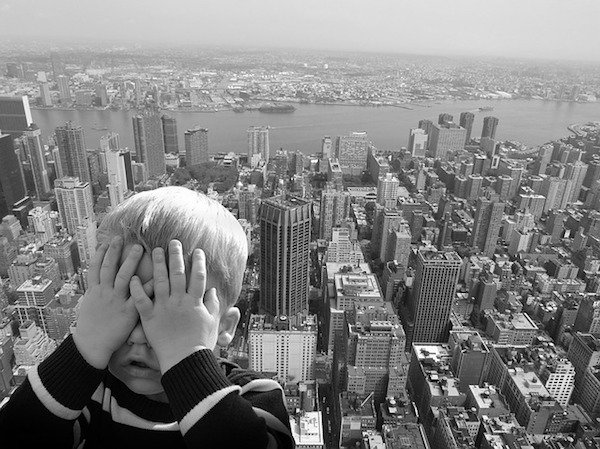 Why we’re afraid of heights. Other than common sense, it’s a physiological reaction. When you’re up high, your inner ear feels a different pull of gravity and tells your senses that the distance between you and the ground has changed. If the distance is higher than 30 feet (3 stories), the body goes into panic mode as your eyes confirm the same thing your inner ear does. What’s remarkable, is that we’re not born with this fear. Babies aren’t afraid of heights at first. It’s only after they learn to crawl, scoot then walk, that they learn that falling from a height, hurts. It’s the growing sense of space and movement that causes this fear to develop.
Why we’re afraid of heights. Other than common sense, it’s a physiological reaction. When you’re up high, your inner ear feels a different pull of gravity and tells your senses that the distance between you and the ground has changed. If the distance is higher than 30 feet (3 stories), the body goes into panic mode as your eyes confirm the same thing your inner ear does. What’s remarkable, is that we’re not born with this fear. Babies aren’t afraid of heights at first. It’s only after they learn to crawl, scoot then walk, that they learn that falling from a height, hurts. It’s the growing sense of space and movement that causes this fear to develop. -
2.
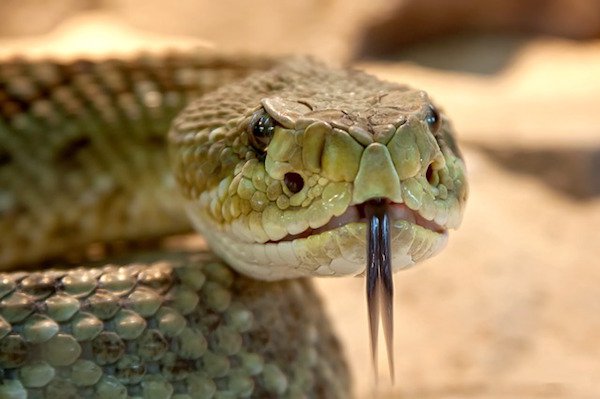 Why we’re afraid of snakes. Ancient human beings were tree dwelling mammals/primates that were easy prey for vicious snakes. Due to their ability to climb into trees and strike with lightning speed, we’ve had to develop a sixth sense about them. Hence, why our eyesight developed through evolution. Not to look at memes and rainbows, but to avoid snakes. In a study done in 2011, it was found that kids can pick out a snake faster than they can find flowers – it’s a genetic quirk we inherited from our ancestors. In fact, the “neural fear module” in our brains, is literally a genetic hard drive full of things that have killed us in the past. We instinctively know what to be afraid of, without be told to.
Why we’re afraid of snakes. Ancient human beings were tree dwelling mammals/primates that were easy prey for vicious snakes. Due to their ability to climb into trees and strike with lightning speed, we’ve had to develop a sixth sense about them. Hence, why our eyesight developed through evolution. Not to look at memes and rainbows, but to avoid snakes. In a study done in 2011, it was found that kids can pick out a snake faster than they can find flowers – it’s a genetic quirk we inherited from our ancestors. In fact, the “neural fear module” in our brains, is literally a genetic hard drive full of things that have killed us in the past. We instinctively know what to be afraid of, without be told to. -
3.
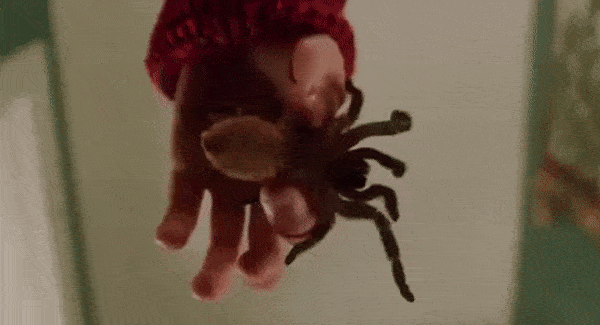 Why we’re afraid of Spiders. This is another thing built into our DNA from our ancestors. In early times, spiders posed a much bigger threat to humanity. Even a non-venomous bite could be lethal due to infections. The ability to recognize and fear spiders meant more surviving offspring, so this healthy fear developed. Interestingly enough, this fear affects more women, then men. Female babies, as young as 11 months are already 4 times more likely to fear spiders. According to anthropologists, this is genetic, as, in our hunter-gatherer days, if a woman were bit by a spider, her offspring would die. If a man got bit, there’d probably be another one coming along soon, anyways. Savage.
Why we’re afraid of Spiders. This is another thing built into our DNA from our ancestors. In early times, spiders posed a much bigger threat to humanity. Even a non-venomous bite could be lethal due to infections. The ability to recognize and fear spiders meant more surviving offspring, so this healthy fear developed. Interestingly enough, this fear affects more women, then men. Female babies, as young as 11 months are already 4 times more likely to fear spiders. According to anthropologists, this is genetic, as, in our hunter-gatherer days, if a woman were bit by a spider, her offspring would die. If a man got bit, there’d probably be another one coming along soon, anyways. Savage. -
4.
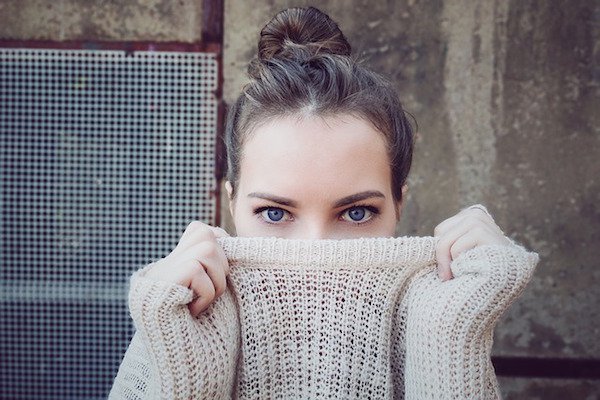 Why people are afraid of eyes. If you’re the kind of person that likes to avoid eye contact in social situations or while on public transit, you’re not crazy. It’s an ancient instinct from birth, that makes us want to look away from eyes we don’t recognize. Since eyes are a window to the soul, they say a lot about us. You can tell if someone is sad, afraid or emotional by their eyes. We can pick up on those emotive eyes and we react accordingly, especially if the eyes are conveying danger. Similarly, we get triggered when someone looks at us. It’s called “scopophobia” and it’s a fear of being watched and evaluated. Finally, our animal instinct also provokes us to stare to establish dominance.
Why people are afraid of eyes. If you’re the kind of person that likes to avoid eye contact in social situations or while on public transit, you’re not crazy. It’s an ancient instinct from birth, that makes us want to look away from eyes we don’t recognize. Since eyes are a window to the soul, they say a lot about us. You can tell if someone is sad, afraid or emotional by their eyes. We can pick up on those emotive eyes and we react accordingly, especially if the eyes are conveying danger. Similarly, we get triggered when someone looks at us. It’s called “scopophobia” and it’s a fear of being watched and evaluated. Finally, our animal instinct also provokes us to stare to establish dominance. -
5.
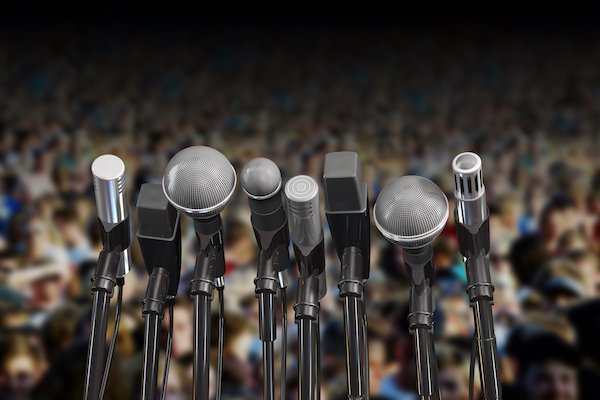 Why we hate public speaking. The fear of speaking in public isn’t just the domain of high school kids with a book report; it’s in all of us. Even people who do it for a living and claim they’re not a afraid of it, sometimes get the symptoms of the fear. They experience butterflies, sweating and have trouble sleeping, but they push through. You can’t avoid it, as it’s in our DNA. This fear comes from our amygdala – the part of the brain that regulates emotion – and it picks up on the faces in the audience and tries to see if any pose a threat, or disinterest. We’re worried about being attacked, judged and ridiculed, especially from unfamiliar faces. This is why people have to cope with picturing their audience in their underwear, or something to that effect.
Why we hate public speaking. The fear of speaking in public isn’t just the domain of high school kids with a book report; it’s in all of us. Even people who do it for a living and claim they’re not a afraid of it, sometimes get the symptoms of the fear. They experience butterflies, sweating and have trouble sleeping, but they push through. You can’t avoid it, as it’s in our DNA. This fear comes from our amygdala – the part of the brain that regulates emotion – and it picks up on the faces in the audience and tries to see if any pose a threat, or disinterest. We’re worried about being attacked, judged and ridiculed, especially from unfamiliar faces. This is why people have to cope with picturing their audience in their underwear, or something to that effect. -
6.
 Why we hate sudden movements, sounds and surprises. As it turns out, you can actually be scared to death. That’s because we’re hardwired to have physical reactions to being scared. When we’re in a normal, undisturbed state, our body is a rest. When something disturbs that rest, our “fight or flight” reflect is triggered and we strive to survive. It’s just safety, really. Sometimes, the adrenalin, the increased blood flow and the other physiological reactions, can overtax the body and it can fail.
Why we hate sudden movements, sounds and surprises. As it turns out, you can actually be scared to death. That’s because we’re hardwired to have physical reactions to being scared. When we’re in a normal, undisturbed state, our body is a rest. When something disturbs that rest, our “fight or flight” reflect is triggered and we strive to survive. It’s just safety, really. Sometimes, the adrenalin, the increased blood flow and the other physiological reactions, can overtax the body and it can fail. -
7.
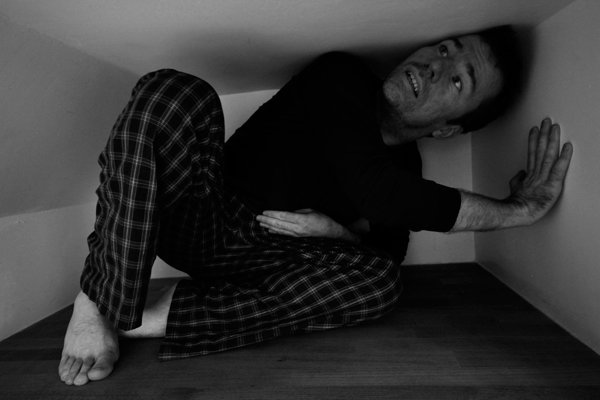 Why we’re afraid of small spaces. Typically, claustrophobia is a learned phobia – something happened to us to make us afraid of small spaces. Recently, however, researchers have been finding that this fear could come from our ancestors. When we’re faced with danger, we can either chose ‘fight’ or ‘flight.’ When we’re in a small space, the hormones that trigger the response flood your body, and you’re stuck. You can’t fight or flee, and you get a panic attack. Other researchers also suggest that this avoidance is a simple survival mechanism, to ensure we don’t get stuck or injured, and are able to survive and procreate.
Why we’re afraid of small spaces. Typically, claustrophobia is a learned phobia – something happened to us to make us afraid of small spaces. Recently, however, researchers have been finding that this fear could come from our ancestors. When we’re faced with danger, we can either chose ‘fight’ or ‘flight.’ When we’re in a small space, the hormones that trigger the response flood your body, and you’re stuck. You can’t fight or flee, and you get a panic attack. Other researchers also suggest that this avoidance is a simple survival mechanism, to ensure we don’t get stuck or injured, and are able to survive and procreate. -
8.
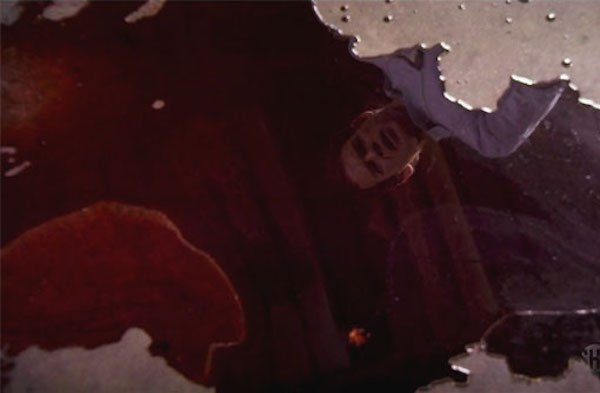 Why some people are afraid of blood. Actually, a lot of people are afraid of blood. The mere sight of it causes some people to get queasy and lightheaded and it all has to do with our evolutionary fear reflex. When we see blood, our vagus nerve, which runs from the head to the heart, is triggered. It sends a signal that tells the heart to slow down, which is why we feel faint and sick. Seeing blood is unnatural and at first, we think it might be ours. When we realize it’s not, then our evolutionary instinct kicks in and we think there’s a predator out for us. By fainting, we’re playing dead and/or slowing down the blood flow/volume to ensure that we don’t get attacked, and don’t lose too much blood if we are. Those that see blood on the regular, however, get used to it and are able to manage that response.
Why some people are afraid of blood. Actually, a lot of people are afraid of blood. The mere sight of it causes some people to get queasy and lightheaded and it all has to do with our evolutionary fear reflex. When we see blood, our vagus nerve, which runs from the head to the heart, is triggered. It sends a signal that tells the heart to slow down, which is why we feel faint and sick. Seeing blood is unnatural and at first, we think it might be ours. When we realize it’s not, then our evolutionary instinct kicks in and we think there’s a predator out for us. By fainting, we’re playing dead and/or slowing down the blood flow/volume to ensure that we don’t get attacked, and don’t lose too much blood if we are. Those that see blood on the regular, however, get used to it and are able to manage that response. -
9.
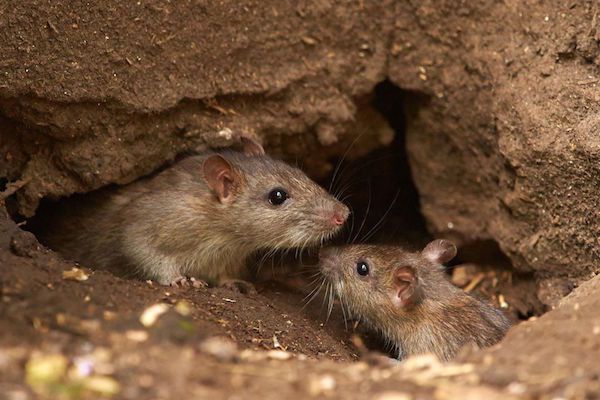 hy we fear mice and rats. These are the smallest things on the planet (mice, at least), but they give us severe chills. The reason is because of our not so distant ancestors. We’re hardwired to hate them because through out civilization, they’ve been the bringers of contaminations and disease into our urban centres and communities. During the Middle Ages, it was mice and rats that carried the disease all over Europe and killed millions. We’re also afraid of them because of the startled response. They sneak up on us, dart around at the periphery of our vision and scare the crap out of us. Sneaky rodents.
hy we fear mice and rats. These are the smallest things on the planet (mice, at least), but they give us severe chills. The reason is because of our not so distant ancestors. We’re hardwired to hate them because through out civilization, they’ve been the bringers of contaminations and disease into our urban centres and communities. During the Middle Ages, it was mice and rats that carried the disease all over Europe and killed millions. We’re also afraid of them because of the startled response. They sneak up on us, dart around at the periphery of our vision and scare the crap out of us. Sneaky rodents. -
10.
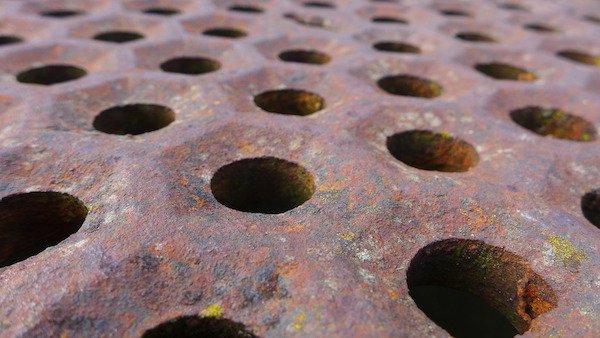 Why we’re afraid of holes. Other than not knowing what’s down inside a hole, there’s also something called “trypophobia.” This is the fear of irregular clusters of holes, and it causes people to have anxiety attacks. This is a relatively new phenomenon, and with plenty of pictures on the internet (Google it, if you dare), scientists believe that our eyes view these tightly grouped holes and unnatural and strange, and it triggers our fear response. It’s been suggested that the holes evoke the marketing on a poisonous animal, as well as the patterns that the holes make (snake scales, bee hives, wasps nests), that make us fearful.
Why we’re afraid of holes. Other than not knowing what’s down inside a hole, there’s also something called “trypophobia.” This is the fear of irregular clusters of holes, and it causes people to have anxiety attacks. This is a relatively new phenomenon, and with plenty of pictures on the internet (Google it, if you dare), scientists believe that our eyes view these tightly grouped holes and unnatural and strange, and it triggers our fear response. It’s been suggested that the holes evoke the marketing on a poisonous animal, as well as the patterns that the holes make (snake scales, bee hives, wasps nests), that make us fearful. -
11.
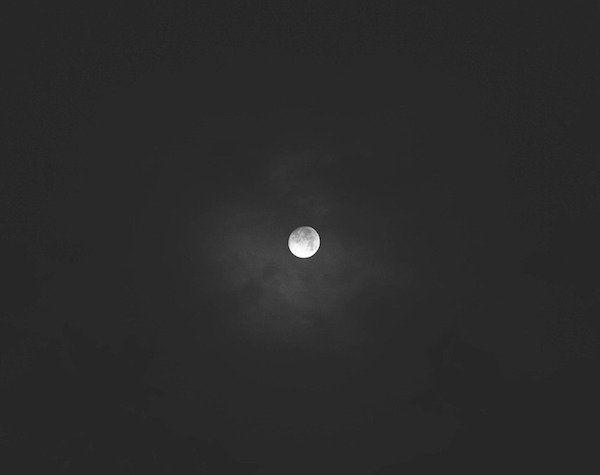 Why we’re afraid of the dark. A lot of kids (and some adults too), are afraid of the dark. Even before they learn about the things that go bump in the night, they fear it. This fear actually stems from our earliest days, when were were hunted at night, by actual beasts. Once upon a time, there were actual monsters in the dark. Predatory animals such as lions, tigers and wolves are known to hunt at night, and use the cover of darkness to stalk their prey. Now, we still fear what’s out there hunting us, both animal and human.
Why we’re afraid of the dark. A lot of kids (and some adults too), are afraid of the dark. Even before they learn about the things that go bump in the night, they fear it. This fear actually stems from our earliest days, when were were hunted at night, by actual beasts. Once upon a time, there were actual monsters in the dark. Predatory animals such as lions, tigers and wolves are known to hunt at night, and use the cover of darkness to stalk their prey. Now, we still fear what’s out there hunting us, both animal and human. -
12.
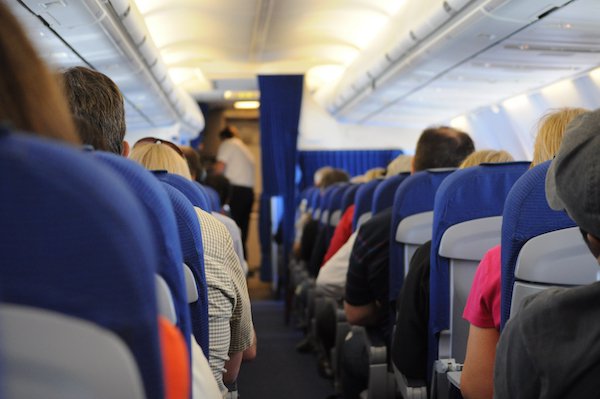 Why people are afraid of flying. The fear of flying is a phobia like no other. It combines multiple fears all into one: heights, claustrophobia, eye contact, etc. Hence, the fear of flying has less to do with crashing, but more to do with a sensory overload. While some people genuinely have a bad flight to make their fear more severe, most people just have that innate fear of being so high up, with no escape.
Why people are afraid of flying. The fear of flying is a phobia like no other. It combines multiple fears all into one: heights, claustrophobia, eye contact, etc. Hence, the fear of flying has less to do with crashing, but more to do with a sensory overload. While some people genuinely have a bad flight to make their fear more severe, most people just have that innate fear of being so high up, with no escape. -
13.
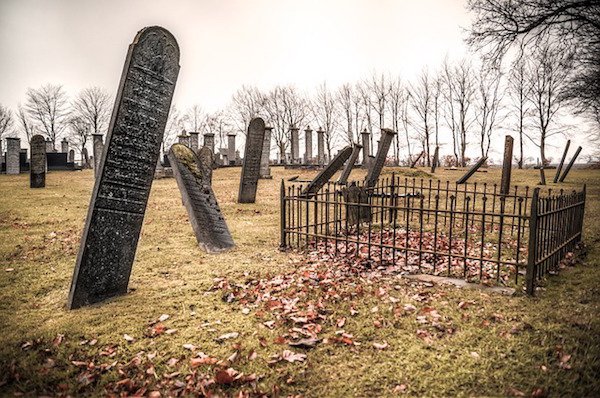 Why people strongly fear death. This is the lynchpin of pretty much all the other fears and phobia’s out there; the fear of dying. We all instinctively seek to preserve ourselves and our potential for procreation. We’re wired to survive, and we fear anything that threatens that. When it comes down to it, there are two different types of ‘death fears.’ The first is “predatory death anxiety” and it’s just the fear that something will kill us – person, situation, animal, etc.. The second is “existential death anxiety” and it’s the knowledge that at some point, life ends. It’s just the fact that you will die at some point, as will your loved ones, that makes you fearful.
Why people strongly fear death. This is the lynchpin of pretty much all the other fears and phobia’s out there; the fear of dying. We all instinctively seek to preserve ourselves and our potential for procreation. We’re wired to survive, and we fear anything that threatens that. When it comes down to it, there are two different types of ‘death fears.’ The first is “predatory death anxiety” and it’s just the fear that something will kill us – person, situation, animal, etc.. The second is “existential death anxiety” and it’s the knowledge that at some point, life ends. It’s just the fact that you will die at some point, as will your loved ones, that makes you fearful.
- NEXT GALLERY
-

- 15 worst drunk purchases people ever made
Why we’re afraid of heights. Other than common sense, it’s a physiological reaction. When you’re up high, your inner ear feels a different pull of gravity and tells your senses that the distance between you and the ground has changed. If the distance is higher than 30 feet (3 stories), the body goes into panic mode as your eyes confirm the same thing your inner ear does. What’s remarkable, is that we’re not born with this fear. Babies aren’t afraid of heights at first. It’s only after they learn to crawl, scoot then walk, that they learn that falling from a height, hurts. It’s the growing sense of space and movement that causes this fear to develop.
13/13
1/13
Categories:
Wow


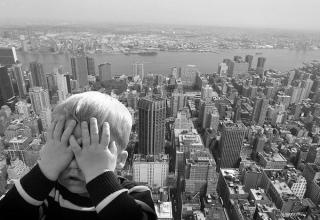





3 Comments